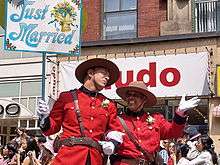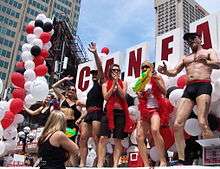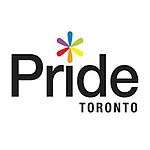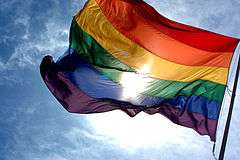Pride Week (Toronto)
|
The official logo of Pride Toronto | |
| Type | festival organization based in Toronto, Ontario |
|---|---|
| Legal status | active |
| Purpose | advocate and public voice, educator and network |
| Headquarters | Toronto |
Region served | Toronto |
| Website | Pride Toronto |



Pride Week is a ten-day event held in Toronto, Ontario, Canada, during the end of June each year. It is a celebration of the diversity of the LGBT community in the Greater Toronto Area. It is one of the largest organized gay pride festivals in the world, featuring several stages with live performers and DJs, several licensed venues, a large Dyke March, a Trans March and the Pride Parade. The centre of Pride Week is the city's Church and Wellesley village, while the parade and marches are primarily routed along the nearby Yonge Street, Gerrard Street and Bloor Street. In 2014, the week served as the fourth international WorldPride, and was much larger than standard Toronto Prides.
Pride Week is organized by Pride Toronto, a non-profit organization. A small complement of seven staff support the work of 19 festival teams and six advisors; each team is responsible for an aspect of the festival. Each team is administered by two or three volunteer team leads. The long-term vision for, and strategic oversight of, the organization and the festival is managed by 12 volunteers on the board of directors.
The organization's most recent executive director was Mathieu Chantelois,[1] who resigned from the position in August 2016.
Festival overview
Main events of Pride Week include the Dyke March and the Pride parade. Although a definitive count of attendees cannot be determined, estimates in recent years have ranged from 500,000 to over one million for the entire week, and about 100,000 for the parade itself. The festival is often touted as being one of the largest cultural festivals in North America and the 22 city blocks that make up the festival site is closed to vehicular traffic.
History
Toronto's Pride Week evolved out of the mass protests that followed the 1981 Toronto bathhouse raids, and celebrated its 25th anniversary in 2005. In the 2005 parade, newly appointed Toronto police chief Bill Blair became the first chief of police in the city's history to personally take part in the parade. He marched alongside politicians of all parties, including several federal and provincial cabinet ministers and Mayor David Miller.
A theme is selected for each Pride Week that reflects the current context of the queer community and helps shape the festivities. Previous themes included "Fearless" (2006), "Unstoppable!" (2007), "Unified" (2008), and "Can't Stop. Won't Stop." (2009).
Queers Against Israeli Apartheid controversy
Toronto Pride Week has not been without controversy, as the growth of the event in recent years has led to questions about whether it has become an overly commercial enterprise at the mercy of its sponsors and business interests. Programming includes all races, communities, and gender identifications. In 2010 there was a controversy over Pride Toronto's decisions regarding the participation of the group, Queers Against Israeli Apartheid (QuAIA). Initially, Pride Toronto agreed not to allow the phrase "Israeli Apartheid" as part of a deal with the City of Toronto (which had suggested that funding would be reviewed if the group was included). However, Pride Toronto subsequently reversed that decision June 23 (after it had received the funds from the city), allowing the group to participate. Several Pro-Israel groups also attended the event.[2][3]
Pride Week's decision to reverse the ban on QuAIA after it had received funding from the city (which was done on the condition that QuAIA not be allowed to participate) drew sharp criticism from several sources. Rob Ford, who was then a mayoral candidate (he was subsequently elected several months later), stated that: "I want to express my disappointment and disgust with Pride Toronto's decision to allow this hateful group to march." Giorgio Mammoliti, who was also running for mayor, announced that he would introduce a motion at the city council demanding that Pride return the $250,000 it had received from the city to reject all of Pride's future funding requests.[4] In an editorial, the National Post called for both the City of Toronto and corporate sponsors to halt all funding to Pride Week, arguing that: "Anti-Israel bigots are free to have their own parade – but not on the public dime. The City of Toronto, whose councilors already have explicitly denounced QuAIA’s “apartheid” propaganda, should prepare to cut funding. Corporate sponsors should do likewise."[5]
In March 2011, Toronto Mayor Rob Ford has said that he will not allow city funding for the 2011 Toronto Pride Parade if organizers allow QuAIA march again this year. “Taxpayers dollars should not go toward funding hate speech,” Ford said.[6] However, on April 13, 2011 the non-partisan Toronto city manager released a report for the city council's executive committee concluding that "the participation of QUAIA in the Pride Parade based solely on the phrase 'Israeli Apartheid' does not violate the City’s Anti-Discrimination Policy. The City also cannot therefore conclude that the use of term on signs or banners to identify QuAIA constitutes the promotion of hatred or seeks to incite discrimination contrary to the Code."[7] Ford indicated that he plans to defund the parade regardless of the City Manager report.[8] On April 15, 2011, QuAIA announced that it would withdraw from the 2011 Pride parade; however, councillor Giorgio Mammoliti responded that he would still introduce a motion to withdraw city funding from Pride Toronto if the committee did not explicitly ban the group from participating.[9]
In June 2012, the Toronto city council voted to condemn the phrase "Israeli apartheid," as part of a resolution recognizing the Pride parade as a “significant cultural event that strongly promotes the ideals of tolerance and diversity.” The resolution said it slams the term "Israeli apartheid" for undermining the values of Pride and diminishing “the suffering experienced by individuals during the apartheid regime in South Africa.”[10]
Financial difficulties
2009
On June 15, 2009, before the 2009 Pride Week festival, it was announced through the office of then Minister of State Diane Ablonczy that Pride Toronto would receive a $400,000 federal grant under the Marquee Tourism program.[11] Shortly after this announcement, Charles McVety's Institute for Canadian Values issued a public statement titled "Conservatives Announce New Program to Fund Sex Parades," which condemned Stephen Harper's Conservative government for granting Pride Toronto the award and conflated the festival with sex abuse against children.[12] It was later revealed that the Conservative government stripped Ablonczy of responsibility for the Marquee Tourism program within days of the announced funding for Pride Week, with the Institute for Canadian Values statement and the ensuing uproar reportedly playing a role.[13] [14] Conservative MP Brad Trost was quoted as saying, "The pro-life and pro-family community should know and understand that the tourism funding money that went to the gay pride parade in Toronto was not government policy."[14]
May 2010
In May 2010 it was revealed that Pride Toronto would not receive further federal funding under the Marquee Tourism program,[15] despite having received a favorable review for its grant application.[16] Toronto City Councilor Kyle Rae commented on the announcement, saying "Reading the political tea leaves from last year, and Diane Ablonczy being shoved aside, I think all of us saw that this was going to happen."[15]
July 2010
In the late summer of 2010 it was reported that Pride Toronto was facing severe financial difficulties because of the withdrawal of future funding from corporations and the City of Toronto due to the decision to allow QuAIA(Queers Against Israel Apartheid) to participate in the parade. Pride Toronto executive director Tracey Sandilands stated in an interview that "the fact that we might not be able to count on city funding next year, and existing sponsors who have given us notice in writing to say that unless we resolve the issues to their satisfaction, they will no longer be sponsoring us next year. So next year looks very bleak at this point.”[17]
Audited financial statements released on January 25, 2011, indicated that Pride week had a $431,808 operating deficit for 2009/2010 (ending July 31, 2010), up from $138,605 in 2008/2009. Pride Week's bank indebtedness had increased significantly, from a surplus of $219,296 in 2009 to a deficit of $155,232 in 2010. In the 2009/2010 financial year, sponsorships, which were identified as the primary source of financial difficulties, increased by 17% over 2009 (from $1,225,044 to $1,469,027). However, the total value of the grants Pride Week received declined from $971,800 in 2009 to $709,025 in 2010.[18]
World Pride 2014
At the 28th annual conference of InterPride, held in October 2009 in St. Petersburg, Florida, the InterPride membership voted to accept the bid of Pride Toronto to host WorldPride 2014 for the first time in North America. In the first round of voting Toronto won 77 votes compared to Stockholm's 61. In the second and final round of voting Stockholm was eliminated and Toronto won 78% of the vote, fulfilling the 2/3 majority needed to finalize the selection process. WorldPride 2014 in Toronto included an opening ceremony with concerts at Nathan Phillips Square; an international human rights conference; a variety of networking and social events including Canada Day and Independence Day celebrations, and an exhibition commemorating the 45th anniversary of the Stonewall Riots.
Pride Toronto officials said that Pride Week 2009 drew an estimated one million people to Toronto and contributed C$136 million to the city's economy, and state that they expect WorldPride to be significantly bigger.[19]
Awards
The Pride Week event received the Top Choice Award for Top Event of the year 2007/2008.[20]
Third-party events
Like many successful Pride events worldwide, the official events are supplemented with non-official events, including the Prism Festival, now in its seventh year and featuring international DJs and all-night dance parties. As well, the Writers' Trust of Canada presents its annual Dayne Ogilvie Prize, Canada's only literary award for LGBT writers, during Pride Week.
References
- ↑ "Mathieu Chantelois is Toronto Pride’s new ED". Xtra!, January 21, 2015.
- ↑ Free speech at Pride: All of our coverage in one place at Xtra.ca.
- ↑ Pride Toronto lays off staff, anticipates $250K loss by Marcus McCann, Xtra, July 15, 2010.
- ↑ Jewish groups decry Pride's Israeli decision, CBC.ca, Friday, June 25, 2010.
- ↑ National Post editorial: Corporate sponsors should walk away from Toronto’s Pride parade by Jonathan Kay, National Post, June 23, 2010.
- ↑ Toronto mayor lays down Pride parade law. Canadian Jewish News, March 10, 2011.
- ↑ Report from the City Manager: Compliance with the City of Toronto's Anti-Discrimination Policy - Pride Toronto. City of Toronto.
- ↑ Phrase ‘Israeli apartheid’ not discriminatory: city manager. Toronto Star, April 13, 2011.
- ↑ "Councillor demands Pride promise to ban Queers Against Israeli Apartheid". Toronto Star, April 15, 2011.
- ↑ Council votes to condemn use of term 'Israeli apartheid'
- ↑ Government of Canada Supports Pride Week Toronto
- ↑ Conservatives Announce New Program to Fund Sex Parades
- ↑ Kady O'Malley, Ablonczy/Pride: And in the second least surprising political news of the day …. Maclean's, September 13, 2009
- 1 2 David Akin, Tourism Minister loses funding program after grant to gay pride week. Canwest News Service, July 7, 2009
- 1 2 Paul Moloney and Vanessa Lu, Decision to nix Pride funding a ‘slap in the face’. Toronto Star, May 8, 2010
- ↑ Andrea Houston, Pride Toronto financial statements show big losses. Xtra!, January 26, 2011.
- ↑ Jonathan Kay, Pride Toronto cuts three positions, loses $250,000 — all thanks to anti-Israeli bigots. National Post, July 16, 2010.
- ↑ Pride Toronto Audited Financial Statements - Year ended July 31, 2010. Xtra!, January 25, 2011.
- ↑ "Toronto To Host World Pride In 2014". CityNews, October 18, 2009.
- ↑ Top Choice Awards
External links
| Wikimedia Commons has media related to Pride Toronto. |

